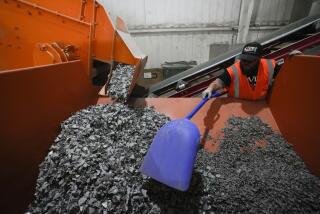Dutch Plan to Recycle Refrigerator CFCs
- Share via
EINDHOVEN, Netherlands — Hot on the tail of international moves to phase out ozone-damaging gases is a Dutch plan that aims within a couple of years to recycle the CFCs in all the country’s worn-out refrigerators and freezers.
The idea is to reprocess chlorofluorocarbons already in the equipment as part of Dutch plans to phase out production of CFCs by the beginning of 1995. CFCs are blamed for destroying the ozone layer that protects the Earth from the sun’s harmful ultraviolet rays.
The environmentally conscious Dutch, running ahead of international plans to phase out CFCs by the year 2000, are combining a recycling tax on new refrigerators with a program to build plants to reprocess all the materials in old units.
Environment Minister Hans Alders opened the first plant in Eindhoven on April 21. It can process 70,000 refrigerators a year--about 10% of those junked by the Dutch annually.
Other planned initiatives mean it will be possible to reprocess all refrigerators and freezers within two to three years.
Most of the CFCs will be reprocessed into less harmful chemicals while some will be reused temporarily. Alders said the state will charge a levy on each new refrigerator or freezer sold after Jan. 1, 1994, to cover the recycling cost once it reaches the end of its useful life. The $26 levy will add a tenth to the price of the average refrigerator.
The Eindhoven plant cost $1.1 million to build. It was set up by Coolrec BV, a joint venture between local gas and electricity utility NV PNEM and waste transport and disposal company Gansewinkel BV.
Until the new recycling tax is applied, the local authority will pay Coolrec $24 for each refrigerator it processes.
“It’s the start of a whole new kind of industry,” Coolrec’s director Cas Kreijns said. “People are starting to realize they have to pay the environmental cost of their consumption.”
An environment ministry official said the project was an important step toward increased recycling.
“There is an important psychological aspect to fridges. People must realize that they can’t just dump them,” said Jan-Karel Kwisthout of the ministry’s air directorate.
The Dutch are taking their lead from neighboring Germany where many environment protection plans are under way and several refrigerator-recycling plants are already up and running.
Kreijns said Germany led the world in recycling technology and CFC recovery from refrigerators.
It is relatively simple to extract the gases from the cooling system, but the Germans and now the Dutch also recycle the insulation foam, which contains two-thirds of the total CFCs in a refrigerator, he said.
“In Germany, you also have laws that some materials must be taken back by the producers. You can expect that in Holland this will happen for some materials in the near future,” he said.
Some car producers, especially in Germany, are already designing cars with their eventual dismantling in mind--a concept known as “Design for Recycling.”
In the Netherlands, electronics giant Philips Electronics NV and other companies are setting up a factory to recycle spent electrical products like televisions and computers.
But Kreijns said that while some Scandinavian countries and Austria were interested in refrigerator-recycling schemes, Britain and the United States have not yet warmed to the idea.
The Dutch embarked on their ambitious National Environment Policy Program in May 1989. It proposed doubling spending on cleaning up the environment over five years and targeted a 70% cut in pollution by the year 2000.
An international treaty, the Montreal Protocol, requires industrialized countries to stop producing and using CFCs by the year 2000, while developing countries have until 2010.
The European Community is also pressing to have the deadline for industrialized countries brought forward to 1996.
Environmentalists said they were pleased the Coolrec plant has opened but urged greater speed in fighting pollution.
More to Read
Sign up for Essential California
The most important California stories and recommendations in your inbox every morning.
You may occasionally receive promotional content from the Los Angeles Times.










